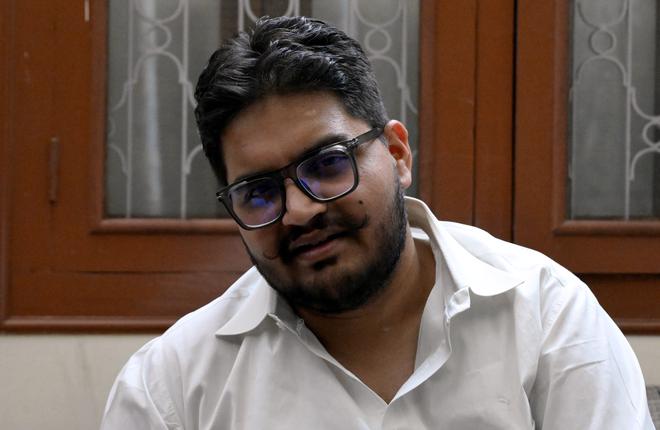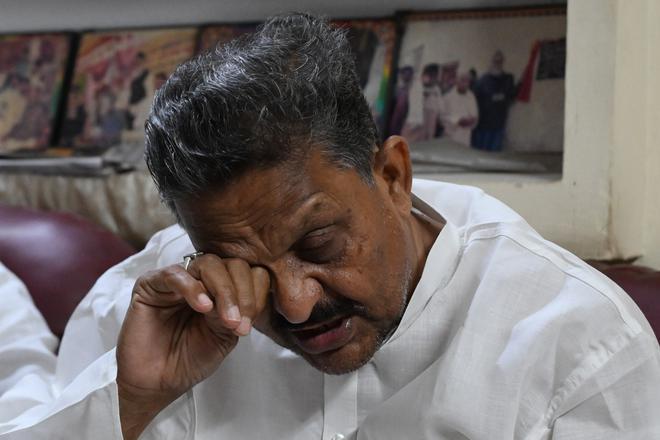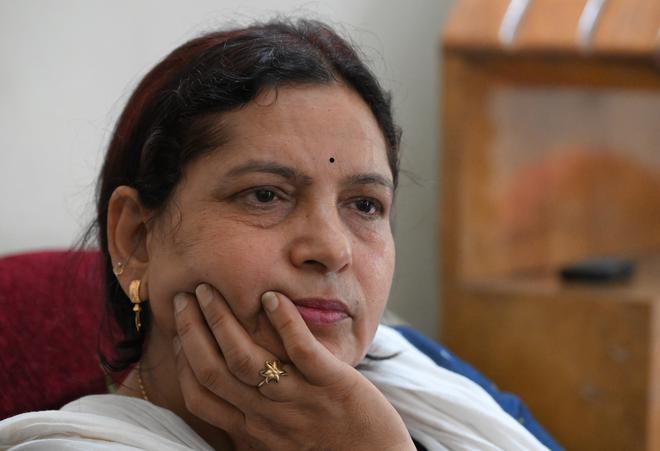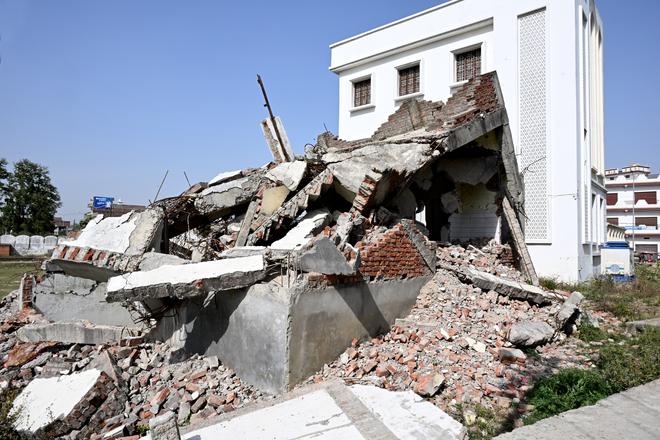When Mukhtar Ansari’s body was laid on a bier at his ancestral home in Yusufpur Mohammadabad town of Ghazipur district, Uttar Pradesh, for people to pay their last respects, Umar Ansari, 26, Mukhtar’s younger son, twirled his father’s moustaches. It was a rare moment of physical proximity in a relationship marked by distance. Through his life, Umar had spent just a little over a year with his father, who had been in jail since 2005, with 65 criminal cases against him, many for murder, extortion, and benami properties allegedly worth ₹600 crore. “He lived and was loved like a king. I wanted my father to look like the hero that he is,” says Umar. “He was the best father anyone could ever have.”
It is twilight, and insects buzz around the light above Umar. He asks one of the many helpers to put it off, and sits crestfallen in semi-darkness, on a veranda that extends to a sprawling terrace of one of a series of homes owned by the extended family. At least 100 armed U.P. police personnel surround the houses that are reached through one-car-broad lanes. A few visitors sit under a tree with a large canopy after they have broken the Ramzan fast.
Mukhtar, 63, died on March 28 after he suffered a cardiac arrest in Banda jail. He was elected as a legislator from the Mau Assembly constituency five times over, from 1996 to 2022, thrice from behind bars.
His family says he was killed. “My father was poisoned,” says Umar, whose older brother Abbas is in jail, and mother Afsa is in hiding, after being declared “wanted”.
Reacting to Mukhtar’s death, Akhilesh Yadav, chief of the Samajwadi Party (SP), of which Afzal Ansari, 70, Mukhtar’s older brother, is a member, attacked the BJP, saying that if a government couldn’t protect lives, it had no right to remain in power, and that the death of a prisoner would erode public confidence in the system. Afzal is contesting from Ghazipur in the upcoming Lok Sabha election, like he always has. He is a two-time MP from the parliamentary constituency and five-time legislator from the Mohammadabad Assembly seat.

Home and community
In his office that occupies the ground floor of their rambling phatak (door, signifying a home), Afzal plays host to many groups of kurta-clad men, who come to commiserate the loss of his younger sibling. Afzal gets a call, and he puts it on speaker mode. A man in Agra tells him how deeply moved he was, hearing about Mukhtar’s death. “I have not met you ever, but we are all in pain with you, and we will reply to this injustice in the elections soon,” he says, in a Lucknavi dialect, a Hindi-Urdu mix, unlike Mukhtar’s own language that had a sprinkling of Bhojpuri, typical of Purvanchal, or eastern Uttar Pradesh.
Once he puts the phone down, Afzal leads the conversation with a step-by-step account from March 19, when Mukhtar reportedly fell sick the first time, to the day of his death. He refers to a conversation, which has gone viral, that Umar had with Mukhtar hours before his death, where the son reassures the father, whose voice is feeble, that everything would be alright soon.
“Mukhtar himself had said in court that he was given poison in his food on March 19. The court had asked the jail administration for a report on this,” Afzal says. “The jail authorities assured us that he is being given treatment, but when he called us the last time, his voice was enough to tell he wasn’t well.”
Afzal deftly swerves the conversation towards his own political career, giving a year-by-year account of his beginnings with the Communist Party of India (CPI). He interlaces it with Mukhtar’s political win, making sure to add that the first FIR against him was in college, when he got caught in the crossfire between his Bhumihar friends, who had a property dispute with the Thakurs.
“When any person, either from lower castes or a minority community, becomes big in society, people do everything to pull him down. That’s what happened with Mukhtar,” says the politician from Ghazipur, a town with unplastered, unpainted houses and a clothes store called AK 47: The Trend War.
Afzal, Mukhtar, and their eldest brother, Sibgatullah, started the Quami Ekta Dal in 2010, which subsequently merged with the SP, though Mukhtar did not join them.
The high walls of his office are lined with pictures of his political lineage: a 12-foot group photo of the 14th Lok Sabha, of which he was a part, CPI comrades, and a few distinguished relatives: Mukhtar Ahmad Ansari, the Congress’s president in 1927; Brigadier Mohammad Usman Ansari, referred to as the ‘Lion of Nowshera’; and Hamid Ansari, former Vice-President of India.
Afzal speaks of his brother’s love for four-wheel drives, 786 as a favourite vehicle number, and cricket (he met his wife at a match). He also declares that they are a zamindari family with lands and shops from which they collect rent, their source of income. He declines having guns anymore.
A group of fat lizards swarms around a tube light, eating insects for dinner.

Political and social clout
A stone’s throw from the home is the family graveyard, set in a fruit orchard with mango and guava trees. Mukhtar was buried here on March 30, amid large crowds and high security.
A day later, at sundown, the dusty earth is being watered by Afroz Ansari, the caretaker. Everything smells of petrichor and roses. There are 12 headstones here, the earliest of Ilyas Ansari dating back to 1907.
Shailendra Kumar, a schoolteacher who is new in town, is visiting the grave with his wife and child. “Bahut suna hai inke baare me (I have heard a lot about him),” says Kumar, who has no opinion on whether Mukhtar was a ‘saviour’ or ‘sinner’, but is simply curious about his life.
In his bio on the U.P. Assembly website, Mukhtar’s “special interests” are listed as protecting Dalits, the poor, maintaining quami (community) unity and brotherhood, tourism, and sports.
In his book, India: A Portrait, British writer Patrick French quotes Mukhtar as saying, “I like Mahatma Gandhi, but if non-violence is not working, I say, ‘Laton ke bhoot baton se nahin maante (If a devil isn’t listening to you, you have to give him a kick)’.” He also talks about the minorities being “subject to the injustice of the Congress party”, that he gives all his money to the people of Mau, and how he only fought the powerful. On Mau’s bumpy streets though, there are few job opportunities and no large hospitals.
In fact, in 2009, then Chief Minister Mayawati from the Bahujan Samaj Party (BSP), which stands for the rights of religious and social minorities in U.P., called him a Robin Hood, asking people to vote for him. In the fickle world of politics though, in 2021, she refused him a ticket to contest polls, saying mafia dons would not be tolerated, despite him winning twice on a BSP ticket.
Just a year before his death, Mukhar had approached a lower court in Barabanki district with a plea to restrain people and the media from calling him “mafia don” and “bahubali”.
The day after the burial, Afroz says All India Majlis-e-Ittehadul Muslimeen chief Asaduddin Owaisi visited the grave at 2 a.m. Owaisi had said earlier, “What the government machinery did with Mukhtar Ansari… is condemnable…. The U.P. government is on the path of anarchy. There is no such thing as law anymore.”
Outside the cemetery, Ram Vilas Yadav, who lives nearby, says, “He was a masiha (saviour) of the poor. Whoever went to him, he would help — whether they needed money, or help with getting pensions released.”

The survivors speak
When Manju Singh, 50, heard the news of Mukhtar’s death on television, her legs turned to jelly. “I began shaking, and I just had to sit on the floor,” she says, adding that it took her back to August 29, 2009, when Mukhtar’s alleged gang members shot dead her husband, Ajay Pratap Singh alias Manna, in broad daylight. “Everyone just ran towards him, and I remember running too, but he was dead,” she says.
“He refused to give him [Mukhtar] his hard-earned money and was killed for that,” says Manju, who claims Mukhtar demanded 10% on a property deal. She opened the Angel’s Learning Garden school a few years after her husband’s death. In fear, her two children had to go underground, and lived that way for some years. She is still fighting to get him implicated in court.
Mukhtar was named as an accused in the murder cases of BJP legislator Krishnanand Rai in 2005, and Avdhesh Rai, the brother of current State Congress chief Ajay Rai, in 1991.
After Mukhtar’s death, Alka Rai, Krishnanand’s wife, visited the Kashi Vishwanath Temple in Varanasi, and spoke to the media, saying she was thankful to Chief Minister Yogi Adityanath and Prime Minister Narendra Modi for justice served after 18 years. Alka had accused both Mukhtar and Afzal of the murder of her husband, though they were acquitted in 2019.
However, Ajay called for a thorough investigation into Mukhtar’s death, as did Mayawati. Mukhtar was also accused of the abduction and murder of coal tycoon Nand Kishore Rungta in 1997, and the Mau riots in 2005.

On the street
In Mau, Shyam Sundar Sonkar, a lawyer, regrets that he could never thank Mukhtar in person. “He helped me get treatment for blood cancer at subsidised rates at PGI, Lucknow,” he says.
In Yusufpur Mohammadabad’s crowded market, where large, loose whorls of sevaiya spill out of shops, Vinod Gupta, who runs an Ayurvedic pharmacy, feels that the ‘downfall’ of Mukhtar began soon after the Adityanath-led BJP government came to power in 2017. “They have zero tolerance for criminals, and this ensured that all cases against Mukhtar were prosecuted properly,” he says, echoing the official BJP line.
Ashok Singh of the BJP, who lost against Abbas in the 2022 Assembly election, says, “If they want to call the action against him slow poison, yes, it was. Both the BSP (in power in 2007) and SP governments (1993, 2003, 2012) always hid his cases, which is why he continued to contest and win from jail. Yogiji ensured that the trials in his cases picked up pace,” says Ashok. Mukhtar was convicted in eight cases over the last 18 months of his life, including two life sentences.
At a rally in Agra on April 3, Adityanath had said, triumphantly, “Ab to gunde jail jaane se bhi dar rahe hain (Now, criminals fear even going to jail).”
Over the past couple of years, the U.P. police have identified 297 people associated with Mukhtar, and booked them in various cases. Properties worth over ₹208 crore were seized from him under the U.P. Gangsters and Anti-Social Activities (Prevention) Act, 1986. Dozens of illegal properties in possession of his aides were allegedly demolished by the State administration. Illegal businesses worth over ₹215 crore have been shut by the State in the last two years.
Shahid Javed alias Lahiri, whose school was demolished by the Mau administration, allegedly because he was one of Mukhtar’s aides, says people in Mau and Ghazipur feel that they have lost their ‘son’. “Mukhtar would promote people of all communities, and most of his aides were Thakurs and Brahmins, he says, adding, “Inki maut se pradesh mein Musalmaan zaroor ek honge (With his death, the Muslims will unite).” Muslims constitute 27% of the population in Ghazipur and 20% in Mau, as per the 2011 Census.
Outside the Kashi Vishwanath Temple, Mahendra Singh and his family wait to enter, because the premises have been sealed off until Acharya Devvrat, the Governor of Gujarat, finishes his darshan. Mahendra is happy that Mukhtar is dead. “Society doesn’t need gangster-politicians,” says the BJP voter, unaware that last year the SP chief had questioned Adityanath on the number of cases against him that had been withdrawn, simply because he was in power.
In the tug of war of U.P. politics, where religion, caste, and crime play vital roles, Mukhtar’s death is being used by various parties to suit their own political narratives.







